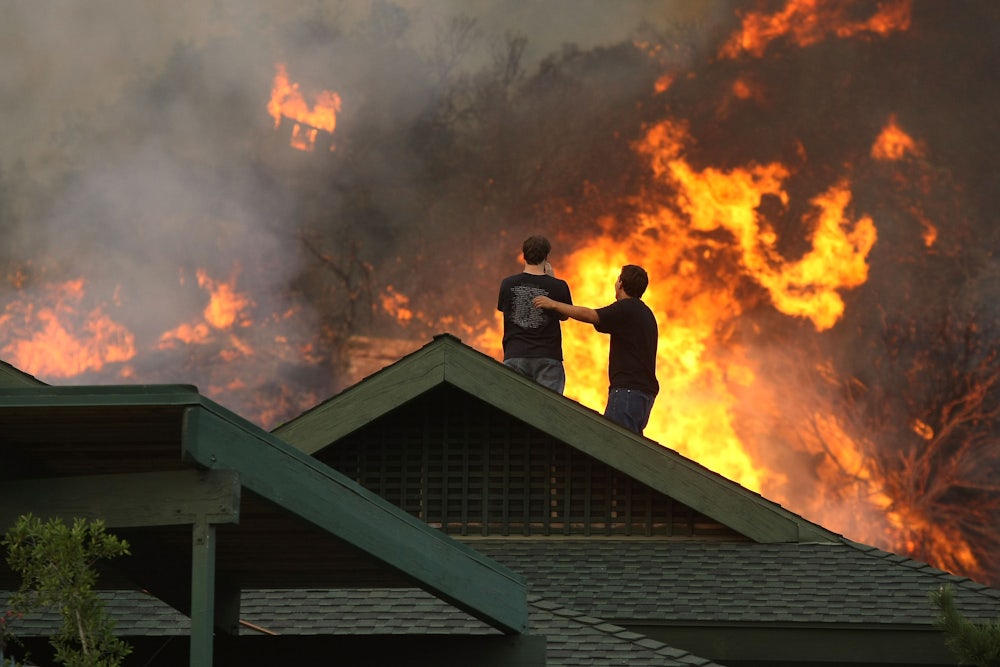Are we on track for a catastrophe or a meltdown? This somewhat gnat-straining debate has emerged around new modeling, some of which suggests that a much-dreaded “worst case scenario” of five degrees Celsius (nine degrees Fahrenheit) of warming by 2100 is less likely than previously thought, and some of which suggests exactly the opposite.
A recent commentary in the journal Nature argues that prior predictions of that worst-case scenario, known as RCP8.5, might be too extreme: A more likely worst case, should countries’ current milquetoast attempts to curb emissions continue, would be warming of around three degrees Celsius by 2100 rather than five, but that could eventually reach four or five degrees sometime in the next century. The piece sparked some heated exchanges on #ClimateTwitter, particularly given that other climate models are running hotter than expected, showing that the world could get warmer, sooner. For policymakers and just about anyone interested in averting catastrophe, however, the debate is tragically academic, as it doesn’t change much about the task ahead: to bring down emissions as quickly as possible.
The Nature commentary’s authors, Glen Peters and Zeke Hausfather, think it’s worth reexamining the more dire predictions. “Overstating the likelihood of extreme climate impacts can make mitigation seem harder than it actually is. This could lead to defeatism, because the problem is perceived as being out of control and unsolvable.” An exaggerated sense of urgency based on apocalyptic predictions, they add, could result in “poor planning.”
But Peters and Hausfather are also quick to point out that they aren’t suggesting that people relax or be optimistic about what a three-degree-warmed world would look like. “We cannot settle for 3°C,” they write, calling even this lower option “a catastrophic outcome.” Such warming would bring mass displacement, dire threats to global food supplies, and a dramatic uptick in deadly disasters. For Caribbean and small island states, average droughts would stretch on for 21 months; in Northern Africa, they could last for five years. “The need to limit warming to 1.5°C, as made clear in the [Intergovernmental Panel on Climate Change]’s 2018 special report, does not depend on having a 5°C counterpoint.”
This caveat hasn’t stopped some from treating Peters and Hausfather’s piece as grounds for gradualism. The climate skeptical Competitive Enterprise Institute glommed on. Also citing this research, Ted Nordhaus urged Wall Street Journal readers to ignore the “fake climate debate” between the deniers like Donald Trump and the alarmists, in which group he includes Greta Thunberg, a favorite target for climate skeptics. The energy industry, he argued, is moving modestly in the right direction toward low- and no-carbon fuels. “All of this suggests that continuing political, economic and technological modernization, not a radical remaking of society, is the key to both slowing climate change and adapting to it,” he wrote. “The world will tackle this problem the way that it tackles most other problems, partially and incrementally.”
There are a number of problems with this conclusion, not least of which is the onslaught of evidence suggesting a dramatic transformation of business-as-usual is exactly what’s needed. Nordhaus, for example, relies on a long-standing claim of environmental economists and many who oppose more dramatic policy solutions: that growing countries’ GDP is the best tool for taking care of their climate worries, as economic growth drives the march of progress on everything from zero-carbon fuels to negative emissions to climate adaptation. The trouble is the persistent and stubborn link between GDP and greenhouse gas emissions, not to mention resource use, which historically rise together. There’s not a great empirical case to be made that this relationship will break down anytime soon, meaning economies may need to pursue other, more sustainable metrics of success. A recent report also suggests that, while important, technologies heralded as climate saviors are still perilously far from being capable of the things computer models and procrastinating politicians suggest. In that context, Nordhaus’s exhortation to carry on more or less as usual, rejecting “the utopian dreams of those who wish to radically reorganize the world,” seems perilously out of touch.
Consider if similar points were made in the realm of foreign policy. Another country—let’s call it Genovia—is threatening an attack on the United States. Intelligence is a little spotty on the exact details of what the attack will look like, whether it will be an atomic bomb in New York or a hydrogen bomb in San Francisco. It might be both. They might go after Miami and Chicago, too. There’s a lot we simply can’t know with the available data. What we do know with absolute certainty is that some kind of attack is imminent, and it will be catastrophic. Nearly every prediction we’ve made so far about the foreign aggressor’s next moves has been correct and much more accurate than our predictions about other countries; often, we’ve underestimated Genovia. In fact, the attack has already started. Last week it sent guerrilla forces to Alaska, where it’s already begun ground operations.
Is the relevant debate in this scenario whether tens of thousands of people are going to die or tens of millions? Would we avoid a solution because it’s too costly or inconvenient? Or would we stop the killing?
This is not a perfect metaphor. But it’s closer than climate deniers and delayers would have you believe. Wildfires across Australia have killed nearly 30 people this season and destroyed thousands of homes and ecosystems, and the last few years of blazes on the West Coast have seen over 100 perish. An estimated 1,600 people died in unusually severe floods throughout India last year. Permafrost is thawing at a rapid clip, suggesting that researchers could be underestimating the impact of that particular feedback loop by as much as 50 percent. Antarctica just logged its hottest temperature on record, at 65 degrees. Everything we know about climate science is pointing toward the same conclusion, and has been for years: Reduce emissions as fast as possible, or condemn hundreds of thousands of people, conservatively, to death.
